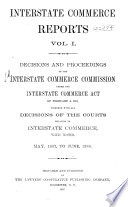 By the preceding course of reasoning we have arrived at these general conclusions.: First, the shores of navigable waters, and the soils under them, were not granted by the Constitution to the United States, but were reserved to the States respectively.... By the preceding course of reasoning we have arrived at these general conclusions.: First, the shores of navigable waters, and the soils under them, were not granted by the Constitution to the United States, but were reserved to the States respectively....  The Monthly Law Reporter - Page 1841857Full view The Monthly Law Reporter - Page 1841857Full view - About this book
 | John Norton Pomeroy - Irrigation laws - 1887 - 344 pages
...only, have the constitutional power to exercise it. * * *" Summing up its conclusions, the court said: "First, the shores of navigable waters, and the soils...jurisdiction over this subject as the original states; thirdly, the right of the United States to the public lands, and the power of congress to make all... | |
 | United States. Interstate Commerce Commission - 1887 - 1588 pages
...Jersey, or to those who have derived title from the State. The shores of navigable waters, and the soil under them, were not granted by the Constitution to...States, but were reserved to the States respectively. Pollard v. Ilagan, 3 How. 212 [44 US bk. 11, L. ed. 565]. The right of eminent domain over such lands,... | |
 | Hubert Howe Bancroft - British Columbia - 1888 - 834 pages
...surveys materially.37 This was owing to a decision of the supreme court of the United States, that the shores of navigable waters, and the soils under...the United States, but were reserved to the states respectively.88 The amount selected and surveyed as swamp-land in 1874 was nearly 167,000 acres. In... | |
 | Christopher Stuart Patterson - Constitutional law - 1888 - 334 pages
...the Constitution to the United States, but were reserved to the riparian- states respectively, and new states have the same rights, sovereignty, and...jurisdiction over this subject as the original states. 8 The United States having no proprietary titles to lands on the shore of a state, under navigable... | |
 | Christopher Stuart Patterson - Constitutional law - 1888 - 342 pages
...infants and other persons not sui juris? The shores of navigable waters, and the soil under those waters, were not granted by the Constitution to the United States, but were reserved to the riparian states respectively, and new states have the same rights, sovereignty, and jurisdiction over... | |
 | Law reports, digests, etc - 1888 - 1020 pages
...these cases may be instructive here. It seems to be well settled in that court, as well as others, that the shores of navigable waters, and the soils under them, were not granted to the United States, but were, with the right of eminent domain over them for all municipal purposes,... | |
 | Wisconsin. Supreme Court, Abram Daniel Smith, Philip Loring Spooner, Obadiah Milton Conover, Frederic King Conover, Frederick William Arthur, Frederick C. Seibold - Law reports, digests, etc - 1889 - 768 pages
...these cases may be instructive here. It seems to be well settled in that court, as well as others, that the shores of navigable waters, and the soils under them, were not granted to the United States, but were, with the right of eminent domain over them for all municipal purposes,... | |
 | Henry Norris Copp - Land tenure - 1890 - 726 pages
...public lands " was left to the general Government. The general conclusions arrived at by the court are: "First. The shores of navigable waters, and the soils...jurisdiction over this subject as the original States. "Thirdly. The right of the United States to the public lands and the power of Congress to make all... | |
 | United States. Department of the Interior - Public lands - 1890 - 756 pages
...The general conclusions arrived at by the court, are — First. The shores of navigable waters, ami the soils under them, were not granted by the constitution...jurisdiction over this subject as the original States. Thirdly. The right of the United States to the public lands and the power of Congress to mike all needful... | |
 | United States. Department of the Interior - Public lands - 1890 - 750 pages
...lands " was left to the general government. The general conclusions arrived at by the court, are — First. The shores of navigable waters, and the soils...granted by the constitution to the United States, but wore reserved to the States respectively. Secondly. The new States have the same rights, sovereignty,... | |
| |